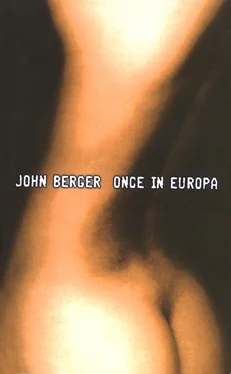John Berger - Once in Europa
Здесь есть возможность читать онлайн «John Berger - Once in Europa» весь текст электронной книги совершенно бесплатно (целиком полную версию без сокращений). В некоторых случаях можно слушать аудио, скачать через торрент в формате fb2 и присутствует краткое содержание. Год выпуска: 2014, Издательство: Bloomsbury Publishing, Жанр: Современная проза, на английском языке. Описание произведения, (предисловие) а так же отзывы посетителей доступны на портале библиотеки ЛибКат.
- Название:Once in Europa
- Автор:
- Издательство:Bloomsbury Publishing
- Жанр:
- Год:2014
- ISBN:нет данных
- Рейтинг книги:3 / 5. Голосов: 1
-
Избранное:Добавить в избранное
- Отзывы:
-
Ваша оценка:
- 60
- 1
- 2
- 3
- 4
- 5
Once in Europa: краткое содержание, описание и аннотация
Предлагаем к чтению аннотацию, описание, краткое содержание или предисловие (зависит от того, что написал сам автор книги «Once in Europa»). Если вы не нашли необходимую информацию о книге — напишите в комментариях, мы постараемся отыскать её.
Once in Europa — читать онлайн бесплатно полную книгу (весь текст) целиком
Ниже представлен текст книги, разбитый по страницам. Система сохранения места последней прочитанной страницы, позволяет с удобством читать онлайн бесплатно книгу «Once in Europa», без необходимости каждый раз заново искать на чём Вы остановились. Поставьте закладку, и сможете в любой момент перейти на страницу, на которой закончили чтение.
Интервал:
Закладка:
He stood surveying the trees as he might have surveyed his sheep. It was there that he would find what he awaited. And his discovery of the place of arrival was itself a promise that his waiting would be rewarded. He walked slowly back to the house but the copse was still before his eyes. Night fell but he could still see the trees. In his sleep he approached them.
The next day he walked again through the orchard towards the stream. And, arms folded across his chest, he studied the copse. There was a clearing. It was less dark between the trees. In that clearing she would appear.
She had lost her name — as the champagne bottle which he was keeping for her arrival had lost its label. Her name was forgotten, but everything else about her his passion had preserved.
During the last days of the year, the clearing in the copse grew larger and larger. There was space and light around every tree. The more he suffered from pains in his body, the more certain he was that the moment of her arrival was approaching. On the second of January in the evening he entered the copse.
During the night of the second, Boris’s neighbours heard his three dogs howling. Early next morning they tried the kitchen door, which was locked on the inside. Through the window they saw Boris’s body on the floor, his head flung back, his mouth open. Nobody dared break in through the window for fear of the dogs, savagely bewailing the life that had ended.
So I have told the story. The wind is driving the powdered snow into deep drifts. Everything is being covered in white, even the air. If you walk across this wind, out in the fields away from the shelter of the village, it will line your cheeks with ice in one minute and the pain in your skull, if you stay there, will grow like a concussion after a blow.
Anyone who believes that evil does not exist and that the world was made good should go out tonight into the fields.
On a night like this a game of cards is like a bed dragged into the middle of the room. Four of us huddle together to play belote. The electricity has been cut. The two candles give just enough light to see the cards in our hands. La Patronne puts on her glasses. Sometimes she takes a torch out of her pocket to distinguish between a heart and a diamond.
The Time of the Cosmonauts
If every event which occurred could be given a name, there would be no need for stories. As things are here, life outstrips our vocabulary. A word is missing and so the story has to be told. What, for instance, was the relation between the old shepherd Marius and the baby in Danielle’s womb when she left the village? Was he the child’s godfather? Hardly.
The story began and ended in the summer of 1982, high up in the alpage which we call Peniel. Some say that they know the name Peniel comes from the bible. Genesis. Chapter 32. But if you read that, it won’t really tell you what happened between Marius and Danielle.
Peniel is a plateau at an altitude of 1,600 metres. One edge of the plateau dominates, from a colossal rockface, the village below. From there, when there’s a rainstorm and it’s sunny, you can look down onto the top of a rainbow — as if it were the arch of a bridge at your feet. The rockface is mostly limestone, occasionally mixed with flysch. The other edges of the plateau are lost in the mountains beyond.
Once there was a forest on this plateau and some gigantic tree trunks are still preserved beneath a layer of clay, under the topsoil on which the pastures grow. Where this clay and the ancient forest are nearest to the surface, the earth is oily and damp, and on the rocks a dark green moss grows, which, if you touch it or lie down on it, feels like fur. This is how the rocks become like animals.
A number of years ago when the Russian, Gagarin, the first man in space, was circling the earth, every one of the twenty scattered chalets at Peniel housed, each summer, cattle and women and men. So many cattle that there was only just enough grass to go round. By common accord grazing time was limited. You got up at three to milk and you took the cows out to pasture as soon as it was light. At ten, when the sun was beginning to climb high in the sky, you brought them home and made your cheese. In the stable you gave them grass which you’d scythed at midday. After lunch you took a siesta. At four you milked again, and only then did you take the cows out a second time to pasture, and there you stayed with them until you could no longer see the trees but only the forest. You brought the cows back in and when they were bedded down on their straw, you could go outside and peer up into the night, where the Milky Way looked like gauze, and try to spot Gagarin in his circling Sputnik. All this was twenty-five years ago. During the summer in question — the summer of 1982—only two of the twenty chalets were inhabited, one by Marius and the other by Danielle, and there was so much grass they could let their animals graze night and day.
The two chalets are separated by a pass flanked by two peaks, the St. Pair and the Tête de Duet. It took Danielle half an hour to walk across the pass to Marius’s chalet.
Why do he-goats smell so strongly? Marius asked her when she arrived the first time. After a winter of ice and snow you go into the stable and you know that last year there was a he-goat here! Rams don’t smell like that, bulls don’t smell like that, stallions don’t smell like that, why do he-goats? The only other smell as strong as the smell of the he-goat, Marius continued, is the smell of a tannery. When I came back to the village, it took me six months to get that stench out of my skin. When I came back to the village, you could pluck a hair out of any part of my body — he fixed Danielle with his shrewd unflinching eyes so that what he meant should not escape her — any part of my body, sniff it, and say: this man has worked in a tannery.
What do you want a he-goat to be? replied Danielle, all he-goats have a strong smell, don’t they?
Another thing — apart from the stench of the tannery — which Marius brought back with him to the village was his way of wearing a hat. He wore his hat pulled rakishly down over one eye. Like a boss. Not the boss of a factory but of a gang. And he was never without a hat. He slept with a hat on. When he brought in his cows after a storm — if the downpour is violent they refuse to budge, they put down their heads, they arrange their backs like roofs so the rain runs off either side, and they wait — when Marius brought in his herd after a storm and his hat was so drenched that even indoors it went on raining, he took it off and straightaway put on another.
Putting on a hat was for him a gesture of authority, and from the age of thirty to the age of seventy, the authority of the gesture had not changed. He wore his hat now as if he were expecting total obedience from thirty cows and one dog.
That’s Violette there, he muttered to Danielle, pointing with his stick to a large brown cow with black eyes and horns. Always the last to come when called, always wandering off by herself, she has her own system, Violette, and I shall get rid of her in the autumn!
He had lost his father at the age of fourteen. His father, who married twice, had a passion for cards. Every evening in the winter he would say: Sauva la graisse! Wipe the grease off the table, we are going to play cards. And so he became known as Emilien à Sauva, and his son as Marius à Sauva.
Emilien, the father, left little behind except debts. The family house was sold, and Marius, who was the eldest son, had to leave to look for work in Paris. As he climbed for the first time in his life into a train, he swore that he would come back with enough money to pay off the family debts and that eventually he would have the largest herd of cows in the village.
Читать дальшеИнтервал:
Закладка:
Похожие книги на «Once in Europa»
Представляем Вашему вниманию похожие книги на «Once in Europa» списком для выбора. Мы отобрали схожую по названию и смыслу литературу в надежде предоставить читателям больше вариантов отыскать новые, интересные, ещё непрочитанные произведения.
Обсуждение, отзывы о книге «Once in Europa» и просто собственные мнения читателей. Оставьте ваши комментарии, напишите, что Вы думаете о произведении, его смысле или главных героях. Укажите что конкретно понравилось, а что нет, и почему Вы так считаете.












